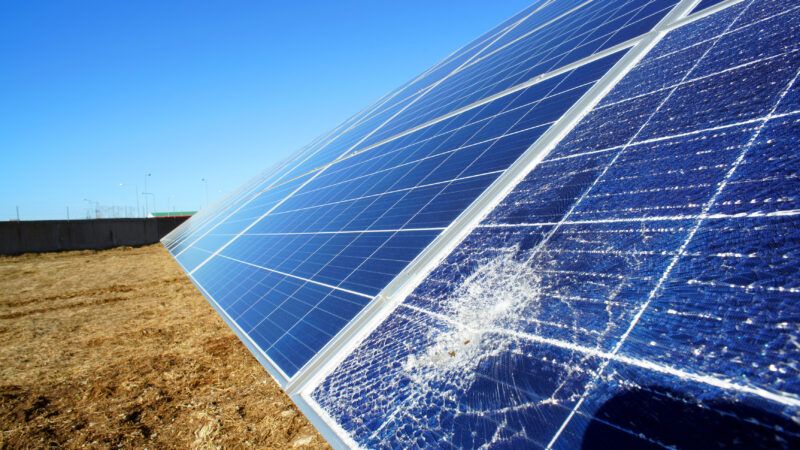How a Tiny Solar Company in California Might Convince Biden To Sabotage America's Whole Solar Industry
Tariffs requested by an "artisanal solar boutique" based in San Jose might jeopardize 45,000 jobs and halve America's future solar panel deployments.

A tiny solar panel manufacturing firm with outsized political clout is poised to wreak havoc on the entire American solar energy industry.
And the White House, which at least theoretically supports expanding America's green energy industries, might just go along with the madness. It's a tricky situation for President Joe Biden to navigate, one that requires choosing between two of his top policy priorities: industrial protectionism and combatting climate change.
In February, the California-based company Auxin Solar submitted a petition to the U.S. Department of Commerce asking for a more expansive set of tariffs targeting imported solar panels and their component parts. The company alleges that American solar panel manufacturers are avoiding tariffs on Chinese-made solar panels and components—tariffs originally imposed in 2018 by the Trump administration but renewed earlier this year by Biden—by buying parts made in Cambodia, Malaysia, Thailand, and Vietnam that are sometimes made with Chinese parts.
That is, of course, pretty much exactly what you'd expect any company to do. But Auxin argues that the federal government now has a responsibility to stop what it calls attempts to "circumvent" those tariffs on Chinese imports by imposing new tariffs on imports from those four other countries as well. In March, the Commerce Department launched an investigation to determine whether those tariffs are to be added.
According to the Solar Energy Industries Association (SEIA), those prospective tariffs would target the source of about 80 percent of America's supply of crystalline silicon photovoltaic cells, the fundamental building blocks of solar panels. In a letter to Commerce Secretary Gina Raimondo in March, dozens of the SEIA's member companies warned that the tariffs would "stall both ongoing and planned U.S. solar projects and lead to the loss of over 45,000 American jobs, including 15,000 domestic solar manufacturing jobs." It would also mean losing about 14 gigawatts of planned solar deployment—about two-thirds of the Energy Information Administration's target for solar deployment this year
All that, the SEIA warned, "because a single company is seeking to inappropriately exploit the law for market advantage."
It sounds like a typical story of big business using its political clout to shut smaller competitors out of the market. But the bizarre thing about this fight is that relatively unsuccessful businesses are holding the rest of the market hostage. Because they have friends in Washington, natch.
Eric Wesoff, editorial director for Canary Media, did some terrific shoe-leather reporting to learn that Auxin Solar's San Jose headquarters is little more than "a rundown industrial building" with a "loading dock…overgrown with weeds." Auxin has just 35 employees and a manufacturing capacity of just 150,000 megawatts annually. It is, Wesoff concludes, an "artisanal solar boutique—not even a minor player when it comes to utility-scale solar, which makes up 75 percent of the U.S. market."
Auxin's co-applicant in that February tariff petition to the Department of Commerce is the Georgia-based Suniva, Inc., a company that hasn't produced a solar panel since 2016 but remains a major player in the politics of protectionism. Suniva was one of the prime advocates for Trump's solar panel tariffs on Chinese imports in 2018, and it pushed Biden to renew those tariffs last year.
It's insane that these two companies might get to dictate U.S. trade policy for solar panels, but it could happen. As Wesoff points out in his excellent and deeply reported piece, Auxin and Suniva have some friends in high places: Sens. Sherrod Brown (D–Ohio) and Rob Portman (R–Ohio) have thrown bipartisan support behind the companies' tariff petition, likely because a major domestic solar panel manufacturer, First Solar, is located in their home state.
Making it harder to import solar panels and photovoltaic cells from overseas is a net loss for the solar industry but a victory for specific producers in America. And Biden's trade union allies support the tariffs too, which means this comes down to a choice between whether the White House would rather appease its political friends or achieve its green energy goals.
Above all, this offers a lesson about how protectionism creates perverse incentives in markets and politics. Trump's decision to impose tariffs on Chinese solar parts and Biden's decision to extend those tariffs have created a bizarre situation where a bankrupt solar manufacturer and an "artisanal solar boutique" might get to dictate the future of an entire industry.


Show Comments (36)